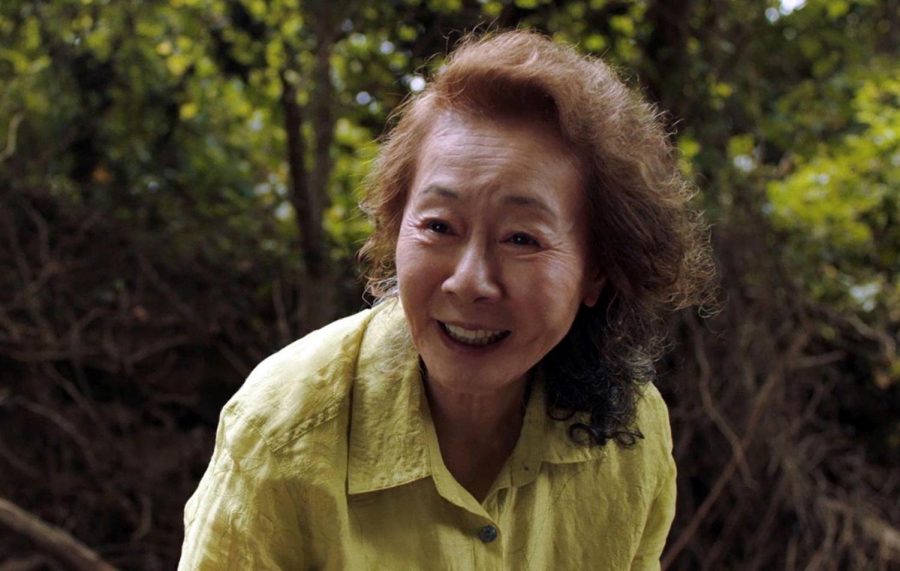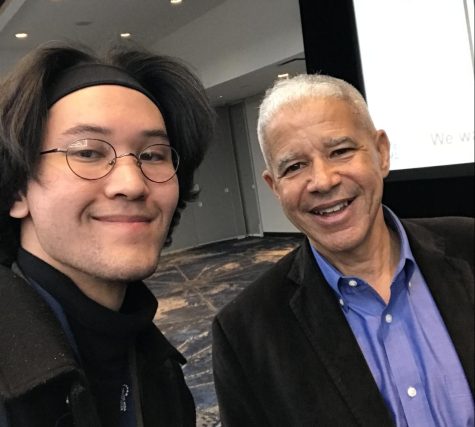Minari: The Honest Exploration of Immigration in America
April 30, 2021
Minari
In many ways, Minari (2020) is a story showcasing the persistence of the American dream. A narrative focused on immigrants, and their struggle to make ends meet is not often explored in American media, giving Minari a unique perspective.
Jacob Yi, played by Steven Yeun, known for his role on the hit show The Walking Dead, is an immigrant father who chose to move his family from California to Arkansas to grow Korean agriculture and sell to vendors in Dallas. To generate income for the farm, Jacob and his wife, Monica, played by Han Ye-ri, work in a factory identifying the sex of baby chicks for a nearby hatchery, similar to what they did in California.
As the family experiences several difficult nights, as a rainstorm invades the land, the children having to adjust to a new environment, and arguments with Jacob arise, Monica decides to call her mother, Soonja, played by Youn Yuh-jung, to move in and assist in taking care of the children. As Soonja travels from South Korea and is settling in, giving gifts from South Korea to Monica and the children, Jacob is working with his newly-hired farmhand, Paul, played by Will Patton, an eccentric Korean War veteran.
The Yi family dynamics are constantly challenged as the film progresses, beginning with the initial argument the night of the rainstorm between Jacob and Monica, straining their relationship throughout the film, making simple conversations difficult. Through the trials and tribulations, the Yi family found ways to stay together and strengthen their relationship.
Minari’s Relevance
Minari had a successful year, from festival season to award season; the film gathered 106 wins and 210 nominations, including six at the 93rd Academy Awards. Of those many wins and nominations, Youn Yuh-jung took the Oscar for “Best Performance by an Actress in a Supporting Role” at the 93rd Academy Awards on April 25.
Many fans were upset with Minari’s results at the Golden Globes as actor Steven Yeun, along with the cast, were snubbed of nominations. The film won the award for “Best Motion Picture” in the Foreign Language category, which sparked a discourse on whether the film deserved this award. On the one hand, Minari’s dialogue is almost entirely in… foreign language, but on the other hand, the film showcased an American story and should be celebrated as such.
In connection with recent events, hate crimes focused on Asian-Americans have been increasing for the past month as many elders have been attacked, beat down, or called demeaning names by those who wish to inflict pain on the community. This rise in Asian hate had originated from former President Donald Trump’s arrogant mislabeling of the Covid-19 virus as the “china virus.”
The United States Senate recently passed the “Anti-Asian Hate Bill,” stating it “very clear that hate and discrimination against any group has no place in America,” Senator Chuck Schumer, Democrat of New York, stated. The bill provides safety and security for Asian-American and Pacific Islanders (AAPI) and being unintentionally released near a tense time, the film offers a refreshing perspective for the community.
Due to recent events of George Floyd’s murder, the United States Senate established a bill on March 3, “Justice in Policing Act of 2020,” which is supposed to “hold law enforcement accountable for misconduct in court, improve transparency through data collection, and reform police training and policing.”
As this bill appears “progressive,” the American people have not seen systematic change in policing. Daunte Wright was brutally murdered on April 11 in Brooklyn Center, Minnesota, by the former chief of police Kim Potter, who has yet to be charged for the vicious crime.
Later in the month, 16-year-old Ma’Kia Bryant was the victim of a deadly shooting by Columbus Police Department officer Nicholas Reardon on April 20.
Asian newlywed John Huynh was brutally stabbed in Washington by an “excited” attacker on April 25.
How effective are these bills? Are they fulfilling their purpose to hold law enforcement “accountable” and to “reform police training and policing?” It seems that these bills are ineffective, but with hope, they will be enforced and put into action in a few months, and lives will not be lost at the hands of police brutality. Time will only tell what programs will be put in place to reform police training and hold law enforcement accountable.
The Minari Plant
Now, after all, what is the minari plant? The plant is “A species of water dropwort, minari, also known as Korean watercress, water celery, or water parsley, or Java water dropwort, is a vegetable found in temperate and tropical climes across Asia,” according to Sam Sontag, a writer and editor based in Brooklyn covering the food industry.
Historically, the plant’s original name is “Oenanthe Javanica” and is agriculturally omnipresent around the world. The vegetable is found in most traditionally cultivated dishes; Minari-muchim being a seasoned water dropwort salad, Minari-oi-muchim is the same seasoned water dropwort salad with cucumber, Minari-buchimgae is water dropwort pancake, and Minari-ganghoe being water dropwort rolls.
In the film, Soonja takes the children out to plant Minari in a natural river nearby the mobile home. The minari plant is only shown in the film about three times, and is analogous to the difficult life that Jacob has chosen. As the minari plant grows in foreign soil, it spreads and grows further, the Yi family moved from their comfortable life in California to adjust to life in Arkansas, and with time, they can grow as well.
















